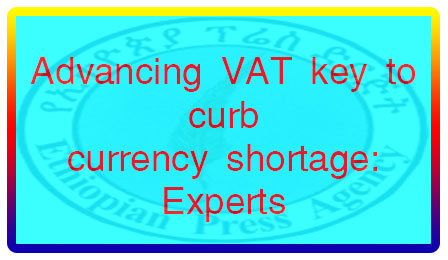
Ethiopia ought to advance its taxing system especially in collecting Value Added Tax (VAT) to improve its export and curb the current forex shortage, said experts. Economist Getachew Minas believes that country’s forex shortage is a supply side problem. There is low capacity to produce exportables, including traditional ones. There is also low institutional and management capacity, contraband, and illegal businesses.
Black market also resulted in low forex earning, he says. According to him, the tax system may not resolve management and institutional problems. The excess of import over export leads to trade deficit that has to be covered with external loan, aid which leads the nation to debt burden in response. On the other hand, the repayment of debt caused shortage of forex.
The meager foreign exchange has been a constraint to the country to import basic necessities. This will make the country a defaulter in the future, Getachew stated. “If the country defaults, it is not entitled to borrow from abroad.” Therefore the government ought to take sweeping measures before the problem worsens.
According to Dasalegn Mosissa, Assistant Professor of Accounting and Finance and Dean at College of Business and Economics in Wollega University, the Government must focus on strengthening VAT system to curb forex shortage than issuing money that may cause inflation. VAT will enable the government to collect money and devote it in various sectors, he said. On the other hand increasing export is the significant measure to bring balance of payment.
This would downsize import for which the country constantly spends high forex. This would stabilize the economy, he noted. He said that VAT has become fashionable in Ethiopia serving above sales tax. It brings significant revenue taxed at each business procedure from production to distribution and consumption level. VAT increases export and helps the nation to get more forex as it does not affect exporters who import raw materials for reexporting, Dasalegn noted.
The contribution of VAT has been snowballing through time. However, people yet have low awareness about it. “Even business people consider it as a cancer.” Therefore, some of them do not properly pay for it, he stated. Accordingly, challenges related to low public awareness, inefficient accounting (recording) system and unwillingness of several businessmen to register for VAT affects the revenue, as to him.
“In this regard, the government must focus on raising public awareness through education and forcing the business people to properly apply VAT system by placing them in the tax bracket.” Experience elsewhere indicated that countries that have improved their tax system are supported by the higher awareness of their people. For example the people of Denmark perceive paying tax as making business or investment for their country.
The government facilitates infrastructural facilities. Therefore tax payers assume themselves as investors behind country’s development, he mentioned. However in our country and in most of the developing nations paying tax [even revealing the amount of capital] is considered as exploitation. “This mindset must be upturned.” Similarly, the government ought to have relevant information about the income source of business people.
It needs to educate the general public about the significance of paying tax that irrigates the country’s development, according to him. The government must assign committed and skilled authorities, tax collectors and auditing professionals among others. On the other hand, it ought to revoke business license to public servants as it opens doors for tax fraud [they know well about tax evasion], he capitalized.
In addition, the government also needs to capacitate auditors, accountants and tax collectors through time to prevent tax avoidance and increase revenue. There should also be a timely assignment of employees and supervisors in institutions that have shortage in this regard, Dasalegn noted. “Not only this, there should be technological advancement. Today, Ethiopian tax payers waste their precious time and energy due to the most predominant and outdated taxing system which involves pay by cash.
Ethiopia should draw lesson from Kenya and South Africa about the application of online tax payment system or e-filing to this end.” VAT which Ethiopia introduced in 2003 is mainly intended to reduce sales tax regressiveness. It also aims at diversifying resources and increasing tax revenues. Over the past nine months, the country hascollected 24,592.98 Birr from goods and services VAT, it was learnt.
On the flip side, a research conducted by Wollela Abehodie, from Addis Ababa University indicated that VAT revenue performance appears to be declining and is low compared to the one in neighboring countries. For instance, VAT and other indirect taxes accounted for about 27 percent of total tax revenue in the year 2013 in Ethiopia, while these taxes contributed about 51 percent in Rwanda and 56 percent in Uganda, the paper indicated.
It also stated that the introduction of VAT aimed at enhancing economic growth and improving revenue performance measured in terms of government revenue to Gross Domestic Product ratio. In comparison with other countries, the study paper remarked that several Latin American countries and some in Africa also use VAT withholding as a means of tackling tax evasion and increase in revenue collections.
The Ethiopian Herald, Sunday Edition May 12/2019
BY YOHANES JEMANEH





